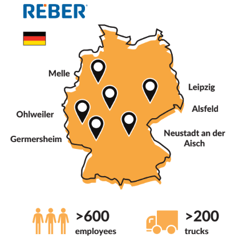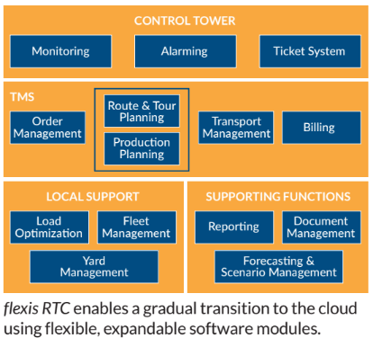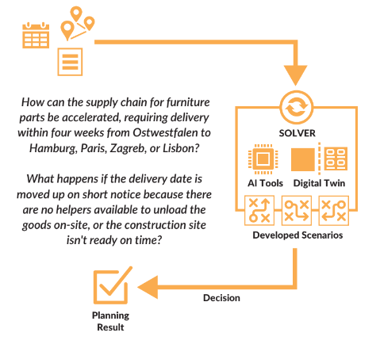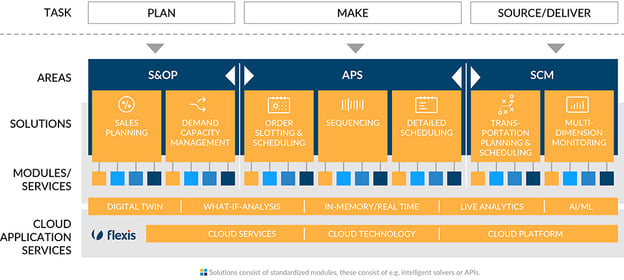Logistics Success Story: Building a Better TMS in the Cloud
Keith LaBotz - November 09, 2023

Greater resilience, efficiency, sustainability, and profits are the fruit of optimized supply chains, driving digitalization. These rewards come with a caveat: partner collaboration and tomorrow's big winners will be the companies building collaborative business processes today. Reber Logistik (Reber) and its partnership with flexis AG in creating their RealTime Transportation Cloud (RTC).
Reber is a full-service logistics provider that began providing specialized services for kitchen and furniture manufacturers in 1976 and has since expanded into additional niches. Reber’s success is rooted in customer collaboration, tailoring its logistics process to each customer’s unique needs. The company’s traditional transportation management system (TMS) made this possible, and Reber recognized modernizing it would significantly expand the potential for collaboration.
 Reber needed to seamlessly transition from its legacy TMS to a modern digital solution without interrupting its complex, customer-driven operation, which presented multiple challenges.
Reber needed to seamlessly transition from its legacy TMS to a modern digital solution without interrupting its complex, customer-driven operation, which presented multiple challenges.
The new digital TMS would allow Reber to address economic and supply chain uncertainties by expanding logistics capabilities, and it would require trouble-free migration across multiple sites.
The Challenge

- Complexity: Reber serves many customers, each with unique business requirements, adding a layer of complexity beyond the ordinary.
- Fragmented Systems: Despite Reber’s holistic view of logistics, their enterprise was fragmented by disparate systems, including the use of spreadsheets, slowing down the realization of their vision.
- Poor Visibility: The absence of a comprehensive, real-time view of the supply chain significantly hampered planning and execution, particularly in a volatile business climate.
Customer Requirements
Reber enlisted Fraunhofer IML, a renowned research institute focused on integrated logistics, to address these challenges. Together, they came up with requirements for a new TMS to streamline logistics while transitioning from Reber's existing process:
- Seamless Connectivity to expand collaboration with supply chain partners.
- Control Tower: A single point of visibility to monitor and manage transportation-related activities across all sites.
- Gradual Deployment: Incremental deployment of a turnkey solution requiring minimal time and effort, giving Reber control of implementation at each site.
- Rapid Customization: Customizable software to support Reber’s complex customer requirements.
- Data-Driven Decisions: Data-driven decisions ingest real-time supply chain information for operational agility.
- Optimization: Continuous transportation and route planning updates based on a holistic supply chain model.
- Route and Tour Optimization: Vehicle Routing and Scheduling (VRS) and Transportation Planning to automate fleet planning, vehicle routing, and loading of trucks.
- Multi-modal Transportation: Routing of multi-modal transportation to minimize costs and emissions while expanding fleet capacity.
The Results
After a rigorous vendor selection process, Reber chose flexis to develop the RealTime Transportation Cloud (RTC) to meet the previously mentioned requirements and enable collaborative logistics.

- Efficiency: Automated planning and vehicle routing will reduce planning labor and optimize transportation costs.
- Adaptability: RTC’s design accommodates the connection of new sites, customers, and partners.
- Resilience: By utilizing the RTC's real-time monitoring capabilities, Reber Logistics will be able to swiftly address any interruptions in its supply chain, resulting in better compliance with delivery schedules and greater transparency, ultimately elevating the quality of its services.
- Agility: Enhanced planning and visibility enable Reber to respond more effectively to changes. For example, continuous monitoring of orders makes accommodating last-minute rush shipments for parts easier, as the illustration below depicts.

The Future Potential of RTC
RTC’s future potential is tremendous, with much of the technology awaiting collaborative opportunities to evolve. The flexis suite of apps is designed to optimize transportation and manufacturing planning. RTC offers an opportunity to extend this capability as a collaborative process between Reber and its customers, synchronizing customer production with Reber's fleet planning.

Aligning customer production and Reber's fleet planning means Reber can provide customers with the physical and digital logistics assets needed to optimize their supply chains. The result is a new business model, and we can expect it will become common in the 4PL space as collaboration increases from solutions like RTC.
Conclusion
The immediate benefits of flexis RTC are compelling, providing a starting point for the digital transformation of logistics and supply chain collaboration. Companies like Reber, with a collaborative mindset, and agile solutions like flexis RTC are an example of innovators at the forefront of this evolution.
Want to learn more? Find out how flexis can work for you .
LATEST POSTS
- Understand Circular Economy in The Manufacturing Industry
- How Can Industry 4.0 IT Integration Be Achieved Smoothly?
- The Significance of Order Sequencing in Discrete Manufacturing
- How to improve your Supply Chain Management: The Power of Control Towers
- Optimizing Human Resource Scheduling in Manufacturing: A Technological Approach


